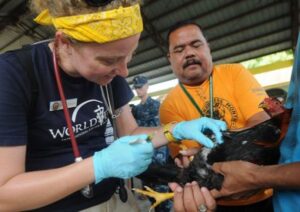Excessive Antibiotics In Animals Pose Urgent Risk To Public Health

A new report from the U.S. Centers for Disease Control and Prevention (CDC) warns that excessive antibiotic use in the meat and poultry industries is giving rise to super-germs that pose a dire risk to public safety.
According to the research, titled “Antibiotic Resistance Threats in the United States, 2013,” more than two million people in the United States get infections that are resistant to antibiotics every year and at least 23,000 people die annually as a result. The report is the first official CDC document to rank antibiotic-resistance threats into categories of urgent, serious, and concerning.
“The use of antibiotics is the single most important factor leading to antibiotic resistance around the world,” states a CDC press release. “Antibiotics are among the most commonly prescribed drugs used in human medicine. However, up to half of antibiotic use in humans and much of antibiotic use in animals is unnecessary or inappropriate.”
Although antibiotic use is restricted in organically-raised foods, even limiting oneself to organic meat and poultry doesn’t eliminate the risk.
A study published recently in F1000Researchfound that raw chicken labeled “organic” or “kosher,” both considered to be higher quality than conventinally-raised chicken, tested positive for antibiotic-resistant E. coli,” reports Food Safety News. “Only chickens ‘raised without antibiotics’ (RWA) came in with reduced, but still contaminated, levels of the E. coli ‘superbug.'”
According to the CDC,”the single most important action needed to greatly slow the development and spread of antibiotic-resistant infections is to change the way antibiotics are used.”
Image: US7thFleet

